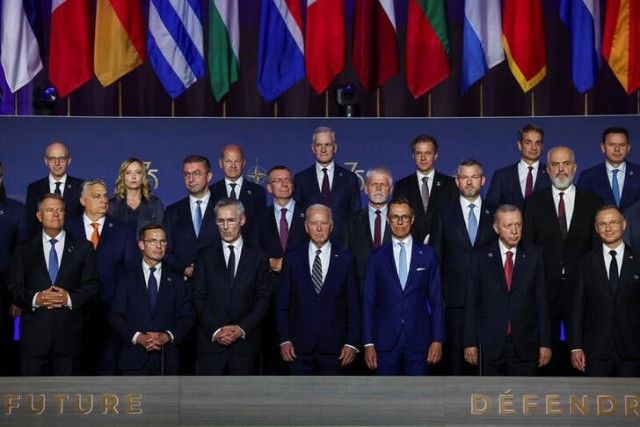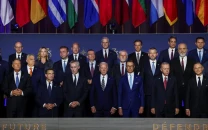NATO after 75
As NATO turns 75, the alliance is urged to balance unity with restraint to avoid provoking further conflicts.

NATO celebrated its 75th anniversary in July, 2024 as the alliance’s member states attended the organisation’s annual summit in Washington. When the Grand Western Alliance was formed in 1949, it consisted of 12 countries, but it gradually expanded and currently consists of 32 member states (mostly belonging to Europe).
Earlier, NATO’s Secretary General Jens Stoltenberg wrote an article in a foreign magazine celebrating the alliance’s formation, aim, and purpose. He also highlighted the organsation’s influence in geopolitics and shaping of the contemporary world order.
However, the Secretary-General failed to mention that NATO was formed to contain the USSR and limit communism’s expansion. Today, the former does not exist, and the latter does not wield much significance and influence in geopolitics as it once enjoyed. Hence, the purpose of NATO’s existence ended decades ago. Instead, the NATO chief argued that the alliance’s aims and purposes are not to cause a war but to preserve peace through deterrence and unity. He lashed at Putin and blamed Russia for starting the war in Ukraine and disrupting the stability and equilibrium of the European Order but forgot to mention that one of the reasons Putin started the war on Ukraine was due to NATO’s continuous expansion and provocations near Russia’s borders.
Before announcing the launch of its ‘special military operations’ in Ukraine, Putin had vehemently stated that Ukraine was the redline and would undertake necessary measures to safeguard Russia’s survival.
As NATO celebrated its 75th anniversary this year in Washington, it must be noted that the Western bloc is more united than it has been over the past years. However, this unity comes at a cost- the cost of war. Russia’s war in Ukraine ushered the world into a new age, an age where the international system is fragile and more prone to conflicts.
The world has seen many conflicts in different regions, and the international system has failed to prevent these turbulences. What is more concerning is that the NATO chief’s article also pointed to China as a threat to the alliance and based on the alliance’s perception; anything that is a threat to NATO is a threat to the entire world order. This may be somewhat true, but the world order it helped create and preserve after the disintegration of the USSR more than 30 years ago is now undergoing significant transformations, and modern-day geopolitics is no longer solely influenced by the West. Hence, labelling China as an adversary or a threat and provoking it would be a significant blow to the alliance as its ramifications would spread across the globe, not just Europe.
As it turned 75 this year, it must take precautions for the future. Although the organisation’s purpose is to create deterrence to preserve peace, provoking its adversaries would create turbulence and disorder in the entire geopolitical spectrum. The war in Ukraine has entered its third year and despite NATO’s assistance to the overwhelmed state and launching an offensive inside Russian territory, has been unable to defeat Russia in the battlefield.
The alliance needs to charter a new course of action and to think of a new way forward, realign its purposes, aims, and strategies, and make sure that it approaches its adversaries with caution. Only deterrence would fail to contain them; too much deterrence and expansion could provoke them further.
The international system has become fragile, and it cannot bear much turbulence, especially among great powers. It certainly cannot afford another conflict, making the world dangerous. Whatever measures the alliance takes, it needs to think that the world is no longer unipolar and that the Global North’s influence is waning, with members of the Global South also wielding significant influence.
Hence, the future of NATO should not focus on deterrence and expansion but rather on caution for the sake of avoiding another great war.
The author works for The Express Tribune














COMMENTS
Comments are moderated and generally will be posted if they are on-topic and not abusive.
For more information, please see our Comments FAQ